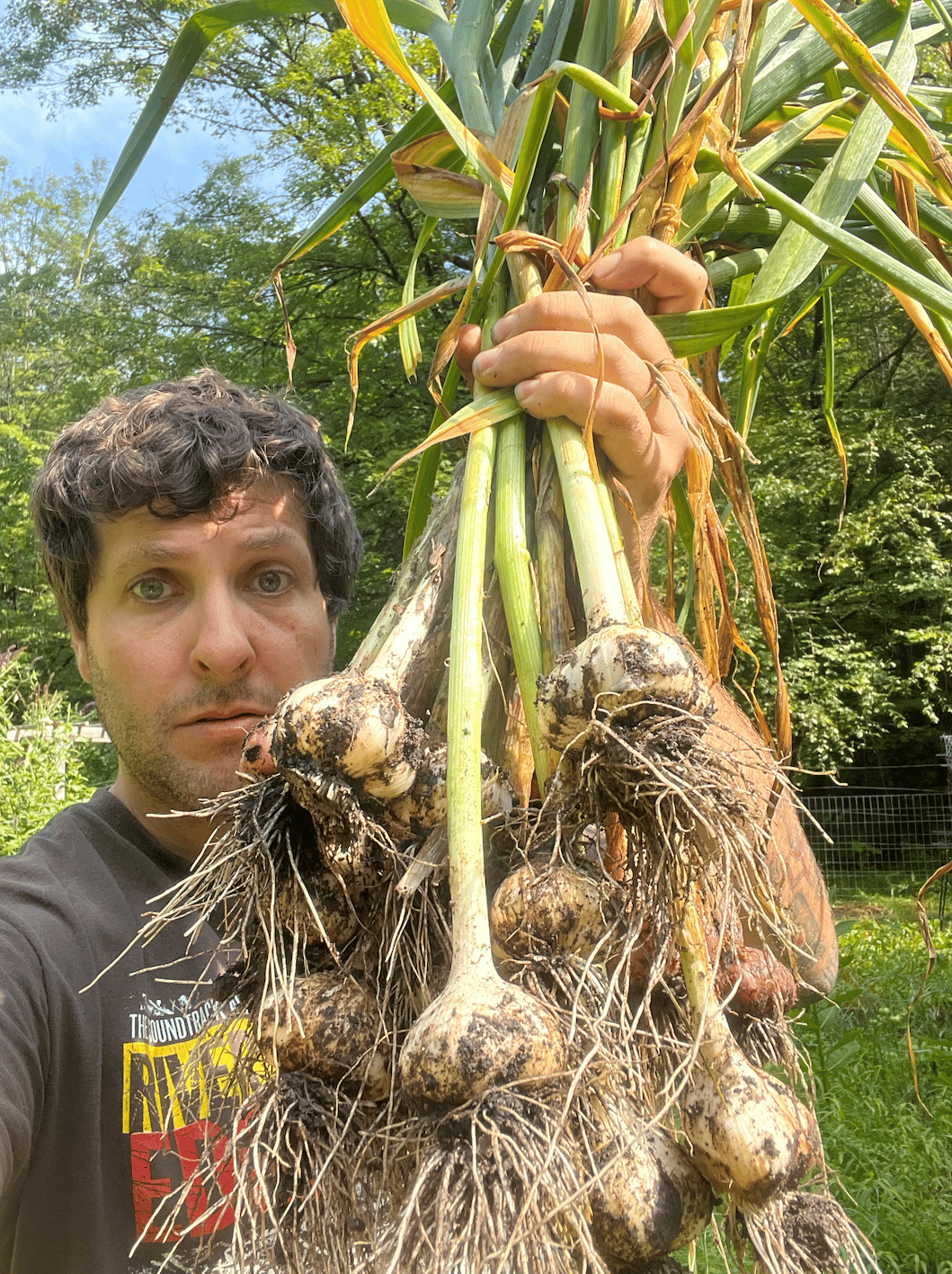
This week in Aaron’s compost: Eggshells, ashes, a paper bag, some rotten lettuce.
Today’s guest composter is Aaron Lefkove, a caviste, recovering restauranteur, occasional writer, and aspiring garlic farmer. If you’d like to submit to the compost interview experience, by all means drop me a line.
How long have you been composting?
Officially with a tumbler that I throw scraps and ash and yard trimmings into, maybe four years. Unofficially for much longer.
Both the Bill de Blasio and Eric Adams mayoral administrations in New York tried then axed then tried again and again various composting programs with varying degrees of success. Those seemed like more of a hassle, and in Adams’ case bins of rotten food on the curb run contrary to his Rat Zero agenda. He has started a pilot program of public composters in select neighborhoods. It seems like a legacy thing to dispel the inevitable FBI perp walk out of Zero Bond as the last fleeting and no doubt meme'd to death image the public will see of him. I have no idea about the program’s adoption or efficacy. I still wish I had one of the brown bins that de Blasio distributed to use as a collection container for my kitchen scraps before they go out to the main tumbler. With composting bins as with mayoral administrations as with life, you never know how good you had it until it’s gone.
What made you start composting?
For a decade and a half I owned and operated restaurants all around Brooklyn. When we started there was a vague notion to compost everything; to reuse the fryer oil to power a vehicle; to get as close to zero waste as possible—I believe it was a selling point on our Kickstarter which came at the time when crowdfunding was in a very nascent state and sentiments such as that got people really jazzed on an oyster bar on the banks of one of America’s most polluted waterways. Anyone who has ever been in the driver’s seat of a hospitality endeavor will tell you that the additional labor and space needed to make reuse of that scale a reality is next to impossible … especially for a smaller operator and especially in New York where every bit of space is calculated vertically. And if they don’t tell you that they are liars.
I did however begin to take things home. For instance we had a lamb sandwich on the menu and I saw a lot of perfectly good roasted lamb bones going in the trash as well as the fatty ends of the ham hocks—these were Benton’s country hams shipped in from Madisonville, Tennessee, and were more or less an American prosciutto with the price tag to match—I started finding these in the trash which was infuriating because you pay by the weight whether it’s bones or fat or gristle. The yield is is up to how creative you can be with finding ways to stretch product. So I’d have the cooks wrap them up and save them, and I’d take them home and throw them in my freezer which slowly started to resemble Jeffrey Dahmer’s Greenpoint pied-à-terre, and once the bones were spilling out all over the place I’d make a two-day slow simmered broth. These were lamb bones mind you and the marrow in lamb makes a particularly pungent and earthy meat jello. The scent of the percolating bones was positively primal. The fat from the Benton’s ham hocks cut an even balance. I wooed my wife on our first date by making her a ramen with that broth. It’s an aphrodisiac as well as a money saver. I could’ve been selling it for eight bucks a cup at the cafe and nobody would’ve batted an eye.
So that was the real entry point to trying to stretch things—especially things I was footing the bill for—as far as they could go. Nothing will make you think on your feet quicker than being financially up against a wall with Baldor week in and week out.
Describe your current composting setup and process.
I’m running multiple composting operations at this point because I split my week pretty evenly between Ridgewood, Queens, and a town two hours north of the city in the foothills of the Catskill mountains called Accord, New York. So there is a constant shuttling of kitchen scraps from the city to the compost mothership upstate. Then there’s the food scraps from the kitchen as well as the ash from the firepit and woodstove—and let me tell you a Vermont Castings woodstove is not only a charming and economical source of heat but also a fantastically efficient producer of browns. There’s a secondary pile of yard trimmings and tall grasses that composts separate from the food scraps so as not to spread weeds and whatever else around when we eventually dig into the composter. I use that stuff to fill in patchy non-garden areas.
What do you compost the most?
It’s nothing out of the ordinary: kitchen scraps, fireplace ash, the occasional paper bag or hunk of cardboard, eggshells, and lots and lots of coffee grounds. I caught Lucinda Williams live last year and she had a bit of stage banter leading into “Car Wheels on a Gravel Road” about her grandmother tossing coffee grounds and eggshells out the backdoor into the garden and how ahead of the curve her Lake Charles, Louisiana, family were. I forget exactly where she was going with it or what the context was but there is no greater validation that what you’re doing is right than hearing it out of the lips of alt-country’s reigning queen.
What gives you the most satisfaction to compost? What do you do with your compost once it's done composting?
Tomatoes for sure. I am maniacal about throwing everything into our composter which as you know is as ideal an environment as you could get for germination. We spread the compost all over the place as a soil amendment because I’m a firm believer in only growing things with creek water and worm shit (nb I can’t overstate the importance of walking around your property and finding earthworms to add to your composter). So this year I just let any volunteers that popped up grow free so we had tomato vines all over the place and they turned out to be the best tomatoes I’ve ever grown—like vines as thick as your wrist and plump fruit that grows well past the typical early fall cutoff. The best one grew out of a rock garden of all places on top of compacted clay soil—the absolute worst possible terroir for a tomato vine. Seeds that unintentionally germinate inside the composter are life that wants to grow rather than life that’s being forced like when you sow seedlings from a nursery. You can take that further and apply the same reasoning beyond just the garden and in your everyday life.

A man and his garlic.
What is your preferred ratio of greens to browns? Defend your answer with science, folk wisdom, and/or vibes.
There’s no hard and fast rule to the ratio of greens to browns. I mean there is but in my experience slimy nitrogen-rich goo gets you to the same place as an evenly deteriorated loamy black gold. At least that has been my experience. There was a great article in the Times last year and other experts with far more experience seem to concur. So I just go on vibe which if you are already someone who is closely monitoring rotting food in your yard and picking up earthworms to relocate them to the front of the buffet line then chances are you’re a person given to introspection so you’ll have loads of vibes to go on.
Anything weird or unusual you've attempted to compost?
We were staying at the Ritz-Carlton in Bachelor Gulch a few years back having a particularly good week on the mountains at Vail and Beaver Creek—after some monster powdery days at Crested Butte because you gotta remember this was that season, it just kept snowing and resorts were open until June and they had no idea what to even do with all that snow—when my wife cleaned out the hair from her brush and made the conscientious decision to pocket it all and bring it back to New York to compost. I’ll tell you with unwavering certainty we are the only people in that hotel to ever do such a thing. Funny enough I looked at our DMs over the years and it seems you and I tried to coordinate a day on the hill on that same trip but were unable to get it together.
I would have been honored to donate my hair for your compost back then, but now I must save it for my own bins. You understand. How do you explain composting to those outside the faith?
There are many roads potentially taken to arrive at a place where you’ll gleefully expound for 2000 words on the virtues of compost and most of them sound like pie in the sky horseshit to the uninitiated. I’d love to tell you I arrived here via the Ram Dass/Buckminster Fuller/Whole Earth Catalog strain of 70s utopian bliss but it’d be doing a disservice to the all around more utilitarian guides that, once you cut through the dire warnings on crop failures and total imminent financial system collapse, offer quite a bit of useful advice on things like composting, crop rotation, straw bale gardening (where you create a composted environment inside the bales which offer superior drainage for those with compacted clay soils), as well as an endless stream of emails hawking off-brand solar generators. It goes without saying the graphic design sensibility was however far more visually appealing in the 1970s.
I will warn you that once you’ve trodden the murky waters of the self published Libertarian prepper world it is only a short slip’n’slide to Ted Kaczynski’s Unabomber screed and then some. That was, we all can agree, an ingenious pitch for a Washington Post byline and a dedicated supplemental section no less.
Any advice for the novice composter? Things you wish you'd done differently? Thoughts on how composting has .... changed you?
Time is your friend, patience is a virtue, and don’t be afraid to experiment. There’s a swampy area of my property that sits on top of an underground spring or artesian well and several summers back during a particularly droughty period when it dried up I dug out a bunch of the deteriorating nutrient-dense muck and made beds to plant garlic, and never in my life have I reaped a head of garlic so perfectly formed and so rich in flavor. After a few seasons of seeing what it takes to grow a proper real head of garlic I’m amazed people will just walk into a supermarket and buy whatever GMO pumped flavorless abomination is masquerading in the produce aisle.
There’s a move now by players in Silicon Valley and various VC-backed startups and what I’d generally refer to as The Tyranny of Big Compost to monetize the world of composting while making the process quicker and easier with minimalist aesthetic bins that look like Macbooks and turn out loam in hours or days rather than weeks or months and to that I say caveat emptor. I’m skeptical of any such advances as it strips away the slow and deliberate conversation between you and your worms and your (their?) piles of decomposing biomass. To borrow a phrase from Tampa, Florida’s death metal overlords—and, with apologies to the Harris/Walz campaign, the best to ever do it when it comes to the ironic camo hat with orange text—Obituary and their 1989 debut album: Slowly We Rot.
At least Obituary never attempted to reacquaint Americans with the architects of the Iraq war. I can’t imagine how many of those Harris/Walz hats are sitting in a forever landfill (because obviously no metalhead worth their salt is ditching theirs til it’s threadbare or in the lost and found bin at the Anchored Inn), fully intact in their adjustable plastic straps and rayon backing, unbroken-down for eons after this planet has become uninhabitable.

